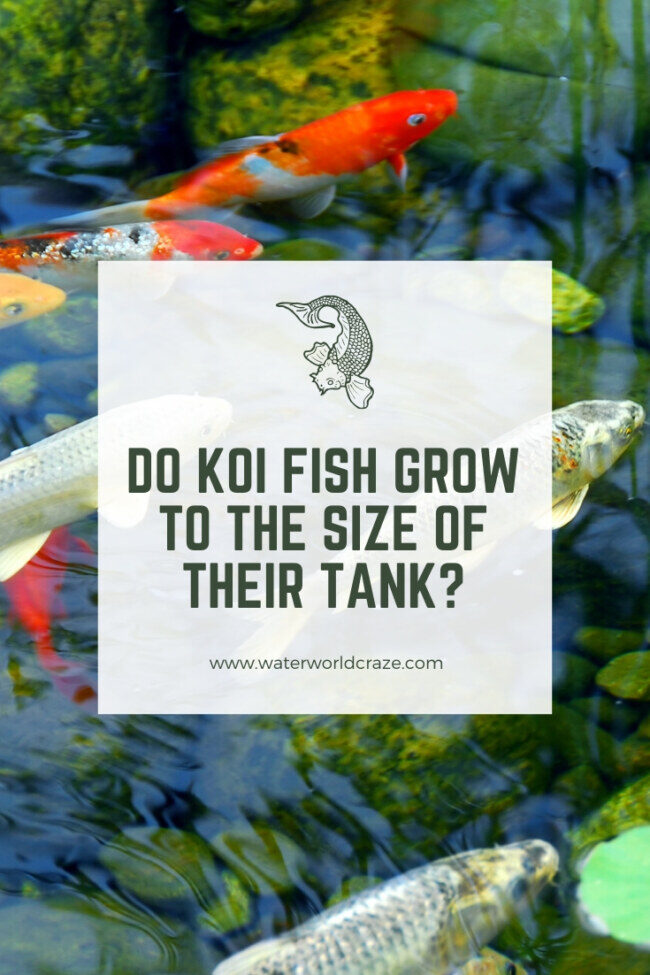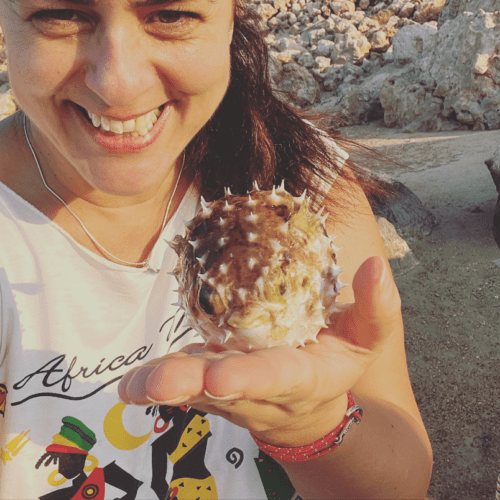 No matter what kind of fish you have, it’s certainly in your best interest to make sure that these fish can grow to their full potential. As we know, koi fish can sometimes grow to be rather large in size. Will the tank or pond that you purchase for them have the potential of impacting their growth?
No matter what kind of fish you have, it’s certainly in your best interest to make sure that these fish can grow to their full potential. As we know, koi fish can sometimes grow to be rather large in size. Will the tank or pond that you purchase for them have the potential of impacting their growth?
Yes and no. A koi fish will grow to the size they are meant to. But it is possible for them to grow too big for the space they are in. If you have a small pond, you won’t be able to have large fish. It is important to make sure that your koi have enough room to swim freely.
This means that you will want to make sure you’re providing your fish with as much space as possible, especially if you plan on breeding them.
In this article, we will give you some advice on how big you should keep your koi’s pond or tank, as well as other factors that will have an impact on how large your fish will grow.
Table of Contents
Can Tanks Stunt Your Fish’s Growth?
This is a fairly common misconception among many fish owners, whether they own koi or other species. The fact of the matter is that tanks do not have an impact on how big your koi will grow.
Regardless of the size of the tank, your fish is going to grow as much as it needs to and as much as it has been genetically predetermined to. However, having a tank that is too small will cause issues for your koi fish, and health issues can impact the amount that they will grow.
The video below shows you what kind of growth you can expect in your koi fish. After the video, we will discuss some of the different factors that will allow your koi fish to grow to their maximum size.
Factors For Koi Growth
The tank size in and of itself will not determine how big your koi will grow, but it could cause your koi fish to develop health problems that will stunt their growth if the tank or pond is too small.
Here are some other factors that will have an impact on the way your koi grow.
1. Age
When a koi fish is in the first couple of years of its life, it will grow at a faster pace than when it gets older. There might come a time when your koi stops growing.
It is important to make sure that you provide your koi fish with all the necessary nutrients and the perfect environment so that they can reach their maximum growth potential later on.
If your koi fish does not grow much in the first few years of its life, it will be difficult to make sure that the fish will get bigger later on.
2. How many fish are in the tank
The number of fish in a tank plays a huge role in how healthy they will be and on how much they will grow.
If you keep too many fish in a tank or pond that is too small, your fish will not be able to thrive, which will have an impact on their growth. You want to make sure that your koi have enough room to swim freely, as this will help them grow as much as possible.
We will discuss how big your tank or pond should be in a later section.
3. Quality of food
As with any other animal, the quality of the nutrition you provide your koi fish will also have an impact on how much they grow.
You should make sure to consult with the breeder you purchased the fish from or with another expert to see what food would be the best option to feed your fish.
The most nutritional food would be the koi flakes and pellets, but some people like to add treats every once in a while, which might include shrimp, other live food, leafy greens, fruits, and more.
Make sure that whatever you give your koi will provide them with the most nutritional value possible. And it’s important to feed them a few times a day to keep their digestion and metabolism where it should be.
The better they are able to digest and absorb their food, the bigger they will grow. It’s especially important to ensure that your koi are getting the best nutrition possible when they are at a younger age.
We recommend reading our following articles:
4. Quality of the water
No matter what kind of fish you have, the quality of the water will play one of the biggest roles possible on its overall health and how much it will grow. Koi fare the best in water that is between 65 and 75 degrees Fahrenheit.
While they do have the ability to live well in many different temperatures, water that is too hot or too cold will stunt their growth.
You also will want to make sure that the pond’s pH and other chemicals are at the right levels and it’s always recommended that you have some sort of filter in the tank or pond to keep the water where it should be.
Clean it as often as necessary so that the water does not become too overrun with algae and waste. 
5. Environment
The environment that your fish are in will also have an impact on their health and growth. Is there anything nearby that could cause your koi to feel afraid? Is it too cold or hot where you live? Do you live in a busy city or somewhere that is a lot more calm?
All of these are factors that could impact your fish. You will want to make sure that they are living somewhere that is calm and tranquil and that they won’t have too many disturbances.
We recommend reading our following articles:
6. Species
The size that your koi will get will also depend on the species. Domestic koi are the smallest because they are meant to grow and live indoors. They typically grow to be between around 12 and 15 inches.
Japanese koi are among the most popular because of their vibrant colors and size. Many breeders prefer this type because of how big they are known to get. Japanese koi can grow between 22 and 26 inches long.
You might also choose to get jumbo koi, which can grow to be at least 30 inches. And finally, the last type is butterfly koi, which can grow to be anywhere between 36 and 40 inches long, but it’s also common for these fish to grow to 24 inches.
So, these are all different factors that can have an impact on how well your fish grow. If you make sure that the pond is big enough and you keep your fish in the right conditions, you can be guaranteed to have koi fish that will grow to their maximum potential.
How Big the Tank, Pool or Pond Should Be
It is generally recommended that you have 10 gallons of water per how many inches your fish are. This is why you most likely should not be keeping your koi in a tank because there simply will not be enough room.
Most people prefer to keep koi in a small pond that is both wide and deep. For example, if your koi fish is 20 inches long, you should have 200 gallons of water.
This is why you will often see koi breeders with huge ponds in their yards. The bigger you are able to have the pond, the better. And you should avoid crowding too many fish in a small pond.
Keeping too many fish around and having a pond that is too small are surefire ways to give your koi fish problems that will affect their growth in the future.
Koi Growth Facts
There are two main questions about the growth patterns of koi fish, both of which pertain to the length of time it takes for koi to grow.
The first question regards how long it takes for koi fish to grow to their full potential. It will usually take around 3 to 4 years for a koi to reach their maximum size, depending on a number of different factors.
Smaller species can reach their maximum size in approximately 2 years and tend to grow at a faster rate.
Then, it depends on the individual koi fish when it comes to how long it will take them to stop growing.
While the size of a koi fish will depend on how well it grew in its youth, most koi fish stop growing when they reach around 10 to 12 years old. However, it’s not completely unheard of for a koi fish to continue growing even after this!
Again, the tank size in and of itself does not affect how large your koi fish are. They will not grow to their tank size and then stop. But, if you have a tank that is too small, it will cause your koi to have health problems that could lead to problems in their growth patterns down the line.
You want to make sure that the tank is big enough (10 gallons of water per inches of fish), and you also want to make sure that the koi are living in the right conditions to keep them healthy. If you take care of them correctly, your fish are sure to grow as big as they can.

Marta, the driving force behind WaterWorldCraze.com, holds a Master’s degree in Marine Biology and has extensive experience in water sports and activities. With over 7+ years of hands-on experience in marine research and conservation, she has participated in numerous underwater expeditions and projects. Her passion for the aquatic world shines through in her expertly curated content. Join Marta as she explores the wonders of marine life and shares her adventures. Connect with her on Instagram @marinebiologymarta for more insights and updates.
